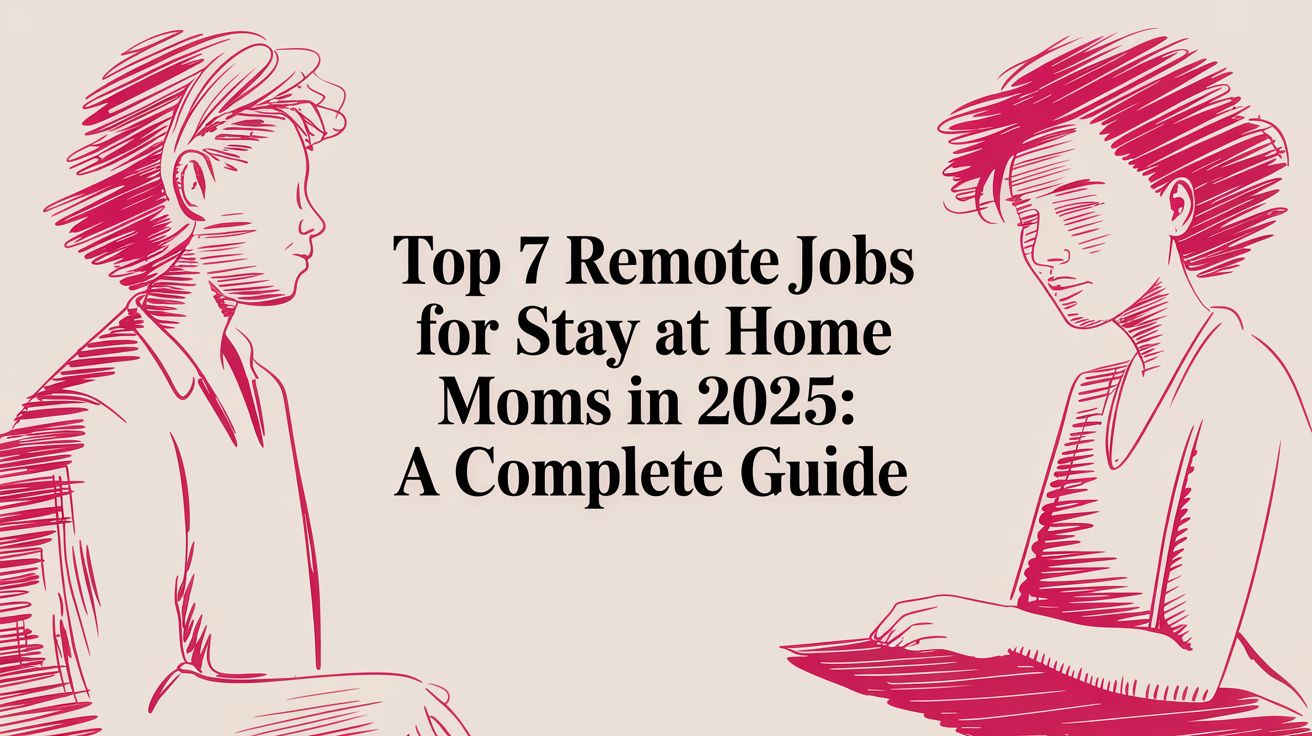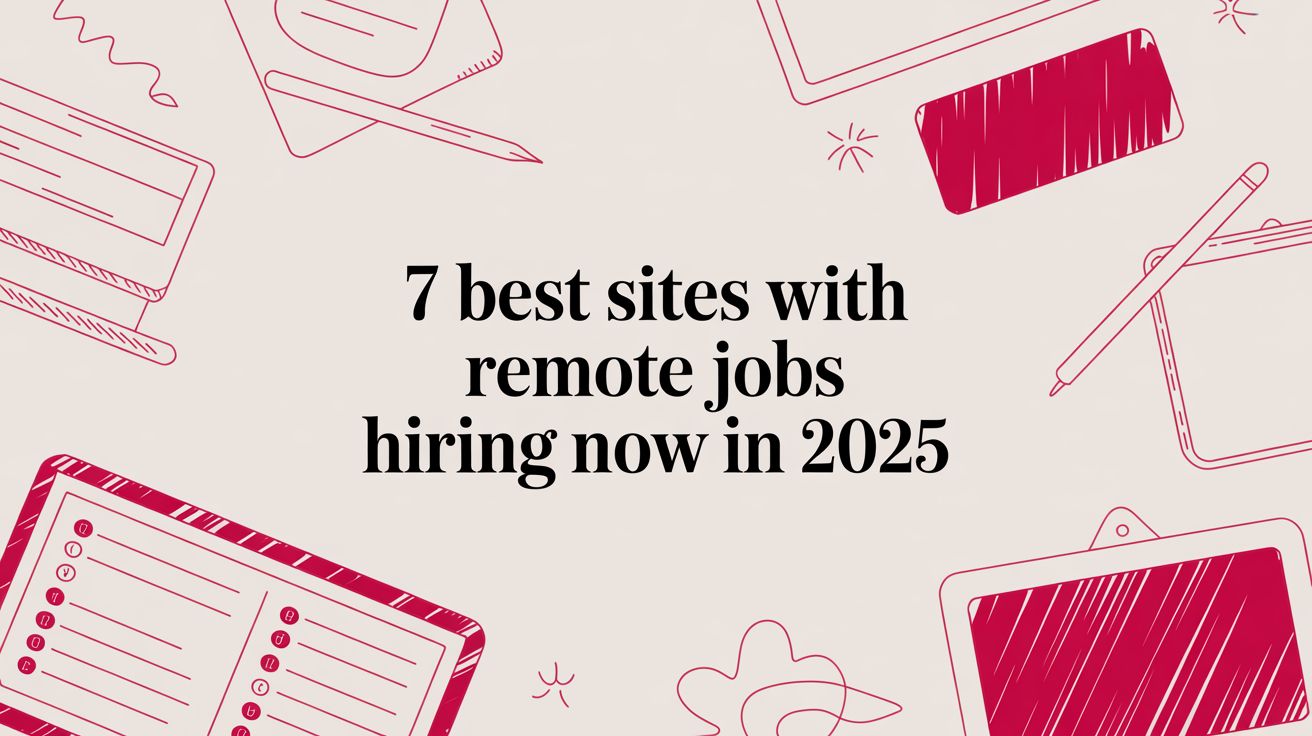Yes, you absolutely can. Landing an entry level remote job with no degree is more possible today than ever. Companies are starting to care way more about what you can actually do than about a piece of paper, opening up thousands of solid, well-paying remote jobs for people from all walks of life.
The Real Deal on Landing a Remote Job Without a Degree
Let’s get right to it. Is it actually possible to build a career working remotely without a college degree? The answer is a resounding yes. The job market has made a huge shift, moving away from a strict focus on diplomas to one that values practical, provable skills.
Think of it this way: a degree used to be the only ticket that would get you into the show. Now, it’s more about having the right tools for the job, and you can pick up those tools in a lot of different ways.
This isn’t just some passing trend. It’s a fundamental change in how companies hire. They’ve realized a four-year degree doesn’t automatically mean someone can perform well, especially when they’re working from home.
What really moves the needle for employers?
- Self-Discipline: Can you manage your own time and stay on task without a boss looking over your shoulder?
- Communication Skills: Are you a pro at keeping everyone in the loop using tools like Slack or email?
- Adaptability: How quickly can you pick up new software and get with the program?
- Problem-Solving: Do you take the initiative to figure things out when you hit a snag?
From Degree-First to Skills-First Hiring
This move to skills-based hiring means that what you can do is way more important than where you went to school. It levels the playing field for self-taught pros, bootcamp grads, and anyone with a killer work ethic. Whether it’s customer support, virtual assistance, sales, or even some entry-level tech roles, your potential is defined by your abilities.
The old way of using a degree as the first filter is quickly becoming a thing of the past. In a remote-first world, your portfolio, your projects, and your proven skills are the new resume.
The Money is Real, Too
And don’t for a second think that “no degree” means “low salary.” The financial outlook for skilled people without a diploma is surprisingly strong. We did a deep dive into thousands of live job postings and found that the average salary for no-degree remote jobs is hovering around $77,866.
This number proves that companies are more than willing to pay for talent, period. Learn more about no-degree remote job salaries and see how your skills can line up with a great paycheck. This isn’t just a pipe dream; it’s the reality of today’s job market.
High-Paying Remote Jobs You Can Land Today

Jumping into the remote job market without a degree doesn’t mean you have to settle for a small paycheck. Some of the most accessible entry-level remote jobs no degree required actually come with impressive earning potential.
The trick is to aim for roles where your skills, hustle, and the results you deliver are what truly matter. Let’s dig into a few of these roles—not just what they are, but what you’d actually be doing day-to-day. We’ll cover the skills you need, what you can realistically expect to earn, and how to get your foot in the door.
Sales Development Representative (SDR)
A Sales Development Representative is all about creating opportunities. As an SDR, you’re the very first touchpoint between your company and a potential new customer. Your days are spent researching companies, figuring out who the key decision-makers are, and then reaching out via email, phone, or social media to book meetings for the sales team.
This role isn’t for the faint of heart; you have to be resilient. You’ll hear “no” a lot, but for anyone who gets a buzz from a challenge, the rewards are huge. Your success is measured by hard numbers, like how many meetings you book, which makes your work ethic far more valuable than a piece of paper.
SDRs can pull in a base salary from $45,000 to $75,000, but with commissions, top performers can easily clear $100,000 in their first year.
Web Developer (Self-Taught or Bootcamp)
The tech world has always cared more about what you can do than what degree you have, and web development is the perfect example. You absolutely don’t need a computer science degree to build great websites and apps. Most people take one of two paths: teaching themselves with online resources or going through an intensive coding bootcamp.
The key is to build a rock-solid foundation in the core technologies:
- HTML: This is the skeleton of any webpage, giving it structure.
- CSS: This is all about the visual flair—colors, fonts, and layouts.
- JavaScript: This is the brain, adding all the interactive and dynamic features.
Once you have the basics down, the goal is to build a portfolio of your own projects. That portfolio is your golden ticket because it shows employers you can deliver real, tangible results. For a self-taught developer, starting salaries often range from $60,000 to $85,000.
Virtual Assistant (VA)
Think of a Virtual Assistant as the remote backbone of a business. VAs handle all sorts of tasks that allow entrepreneurs and executives to focus on the bigger picture. This role is a perfect fit if you’re super organized, proactive, and a fantastic communicator.
The day-to-day can vary wildly, from managing someone’s inbox and calendar to running their social media accounts or even handling basic bookkeeping. This flexibility is great because it lets you specialize in the stuff you actually enjoy. You could become a go-to VA for social media, or a technical VA who helps with website updates.
The beauty of being a Virtual Assistant is that your career can grow alongside your clients’ needs. You start with basic administrative tasks and can evolve into a strategic partner, taking on more complex responsibilities like project management or marketing coordination.
Customer Service Representative
A remote Customer Service Representative is often the voice and heart of a company. You’ll be helping customers with their questions, solving problems, and making sure they walk away with a positive impression. This job is tailor-made for people who are naturally empathetic, patient, and good at thinking on their feet.
You’ll interact with customers through all kinds of channels—phone, email, live chat, and social media. Companies provide tons of training on their products and systems, which makes this one of the most accessible entry-level remote jobs no degree needed.
There’s also a clear path for growth. Do a great job, and you could move up to a team lead, trainer, or quality assurance role. If you want to dive deeper, you can learn more about finding remote work from home jobs without a degree in our detailed guide.
Comparing Top Entry-Level Remote Roles Without a Degree
Feeling a little overwhelmed by the options? It helps to see everything laid out side-by-side. This table breaks down the key details for each role to help you figure out which one might be the best fit for your skills and goals.
| Job Title | Average Entry-Level Salary | Key Skills | Potential Career Path |
|---|---|---|---|
| Sales Development Rep | $45,000 - $75,000 + commission | Resilience, Communication, Persuasion | Account Executive, Sales Manager |
| Web Developer | $60,000 - $85,000 | HTML, CSS, JavaScript, Problem-Solving | Senior Developer, Software Engineer |
| Virtual Assistant | $35,000 - $60,000 | Organization, Communication, Adaptability | Online Business Manager, Project Manager |
| Customer Service Rep | $30,000 - $50,000 | Empathy, Patience, Problem-Solving | Team Lead, Customer Success Manager |
Ultimately, the right role for you depends on what you enjoy. If you’re driven by targets and love a challenge, an SDR role could be perfect. If you love building things and solving puzzles, web development is a great path. No matter which you choose, these roles prove that a degree isn’t the only ticket to a successful remote career.
Building the Skills That Get You Hired

Landing an entry level remote job no degree required isn’t about luck—it’s about proving you’re the best person for the role. When you don’t have a diploma to lean on, your skills become your currency. Employers are looking for solid proof that you can get the job done, especially in a remote setup where being a self-starter is everything.
The best way to build a skill set that gets you noticed is to tackle it from two angles. Think of it like building a house: you need a solid foundation (soft skills) to keep everything stable, and then you need the actual structure that everyone sees (hard skills). You can’t have one without the other if you want to build something that lasts.
Master Your Remote Work Soft Skills
Soft skills are the invisible engine that makes or breaks a remote career. When there’s no manager looking over your shoulder, you have to become the CEO of your own desk. It’s no surprise that a recent study found 77% of employers now prioritize soft skills, knowing they’re a huge driver of productivity and team chemistry.
These aren’t just personality quirks; they’re real, tangible abilities that remote-first companies look for. The big three are:
- Radical Self-Discipline: Can you manage your schedule, sidestep distractions, and turn in great work on time without someone chasing you? That’s self-discipline. It’s about showing up and delivering, even when no one is watching.
- Proactive Communication: In a remote world, you can’t afford to be a passive observer. This means sending regular updates, asking smart questions when you’re stuck, and actually engaging in team chats on platforms like Slack or Microsoft Teams.
- Adaptable Time Management: Remote work often means juggling different tasks, priorities, and maybe even time zones. Getting comfortable with tools like Asana, Trello, or even just a well-organized digital calendar is absolutely essential to keeping things on track.
Remote work success is less about having all the answers and more about being a reliable, communicative, and self-sufficient team member. Your soft skills are the clearest signal to an employer that you can thrive without constant supervision.
Develop In-Demand Hard Skills
Hard skills are the concrete, teachable abilities you need to actually do the work. For jobs that don’t need a degree, your mission is to pick up practical, job-ready skills and then find a way to prove you have them. This is where you build your professional toolkit.
Start by looking at the job descriptions that catch your eye and see what technical skills they mention. For example, if you’re looking at customer service gigs, knowing your way around CRM software like Zendesk or Salesforce is a massive advantage. If you want to be a virtual assistant, you’ll need to be sharp with project management and scheduling tools.
For a deeper dive into what different roles require, check out our guide on the top 20 best remote working jobs to consider in 2025. Many of these roles, like content creation, also lean heavily on strong writing, so it’s always a good idea to find ways to improve writing ability effectively.
How to Gain and Showcase Your Abilities
Picking up new skills has never been easier, thanks to the internet. The trick is to be smart about it and focus on creating real proof that you know your stuff.
- Utilize Online Learning Platforms: Sites like Coursera, Udemy, and the totally free freeCodeCamp offer courses and certificates in just about anything, from digital marketing to programming. A certificate doesn’t just look good; it shows you took the initiative to master a topic.
- Build a Project Portfolio: This is your secret weapon. A portfolio isn’t just for designers. An aspiring virtual assistant could create a sample social media calendar. Someone aiming for data entry could complete a sample project showing off their speed and accuracy. This kind of tangible proof often speaks louder than a degree ever could.
Finding Legitimate Remote Job Opportunities

Alright, you’ve got the skills. Now comes the hard part: sifting through the endless sea of online job listings to find the real gems. The internet is overflowing with postings, but let’s be honest, not all of them are worth your time. Knowing where to look is the first real step to landing a great entry level remote job no degree required.
Think of your job search like fishing. You could cast a huge net into the open ocean and just hope for the best—that’s like using a massive, generic job site. Or, you could find a well-stocked pond where you know your target fish are swimming. That’s a specialized remote job board. Both can work, but the second approach usually saves a ton of time and frustration.
Choosing the Right Job Boards
The platform you use can make or break your job search. Generally, they fall into two camps: the giant aggregators that scrape up everything and the curated boards that focus only on remote work.
- Giant Job Aggregators: Platforms like Indeed and SimplyHired are the search engines of the job world. Their main advantage is sheer volume. The downside? You have to get really good with their search filters to cut through the noise and find quality listings.
- Specialized Remote-First Boards: Sites like We Work Remotely and Remote.co are run by people who are all-in on the remote lifestyle. The jobs are typically higher quality, and you won’t waste time filtering out on-site or hybrid roles.
My advice? Use a mix of both. Start with the niche boards to find high-quality leads, then hit the big aggregators to make sure you haven’t missed anything.
How to Filter Your Search Like a Pro
No matter where you’re looking, filters are your best friend. Just typing “remote jobs” into the search bar is going to leave you feeling completely overwhelmed. You need to get more strategic to find roles that actually fit what you’re looking for.
To zero in on the right opportunities, always use a combination of these filters:
- Job Title or Keywords: Get specific with terms like “Customer Service Representative” or “Virtual Assistant.”
- Location: This is obvious, but always select “Remote” or “Work from Home.” Pay attention to the fine print, though, as some remote jobs still need you to be in a specific state or country.
- Experience Level: This is the most important filter for you. Always look for and select “Entry-Level” or “Associate.”
- Keyword Modifiers: In the main search bar, try adding phrases like “no degree required” or “no experience” to narrow the results even more.
Combining filters is where the magic happens. A search for
"Virtual Assistant" + Remote + Entry-Level + "no degree required"will give you a much shorter, more relevant list of jobs to apply for.
Spotting and Avoiding Job Scams
Unfortunately, where there’s opportunity, there are also scammers preying on hopeful job seekers. Learning to spot the red flags is a crucial skill that will protect your time, your money, and your personal info.
Your alarm bells should be ringing if a job posting or recruiter does any of these things:
- Asks You to Pay for Anything: A real employer will never ask you to cough up cash for training, software, or equipment. Ever.
- Uses Unprofessional Communication: Look out for emails coming from personal accounts (like Gmail or Yahoo) instead of a proper company domain. Terrible grammar and spelling are also huge red flags.
- Seems Too Good to Be True: A job offering a massive salary for very little work or experience is almost always a scam.
- Pressures You to Act Immediately: Scammers love to create a false sense of urgency. They want you to make a snap decision before you have time to think it through.
More and more platforms are now focusing on remote jobs for people without degrees. For instance, a quick search on Indeed can turn up over 4,251 online remote entry-level jobs that don’t require a degree, with roles in data entry, customer service, and project coordination. It’s worth exploring the latest listings to see how companies are opening up their hiring practices.
Beyond job boards, don’t forget your professional network. Our detailed guide on https://remotefirstjobs.com/blog/how-to-find-remote-jobs dives into how you can use platforms like LinkedIn to find amazing opportunities that are never even publicly posted.
Crafting an Application That Stands Out

When you’re going after an entry-level remote job no degree needed, your application has one mission: prove your skills are more valuable than a piece of paper. Think of your resume and cover letter less as a history lesson and more as a sales pitch. You need to sell your abilities, grab the hiring manager’s attention, and show them you can deliver results from day one.
This means you have to flip the traditional application on its head. Don’t lead with an education section that might get you screened out. Instead, you’re going to lead with undeniable proof of what you can do. Let’s walk through how to build an application that not only gets past the bots but actually impresses the human on the other side.
Rebuilding Your Resume for a Skills-First World
Your resume is your first impression, and you have just a few seconds to make it count. For a no-degree path, the standard chronological format can be your enemy. It forces you to put your weakest point—formal education—front and center. Instead, you need a structure that puts your most powerful assets right at the top.
Here’s a simple, high-impact structure to follow:
- Professional Summary: Start with a punchy 2-3 sentence summary. This is your personal elevator pitch, immediately highlighting your top skills and your readiness for remote work.
- Skills & Certifications: This section comes next. List your most relevant hard and soft skills, and make sure to showcase any certifications you’ve earned from places like Coursera or Google.
- Projects & Portfolio: This is where you show, not just tell. Link directly to your portfolio, GitHub profile, or specific projects that put your abilities on display.
- Work Experience: Detail any relevant work history, but focus on accomplishments, not just duties. Use the “Problem-Action-Result” framework to show how you made a real impact.
- Education: Put this section dead last. A high school diploma or GED is all you need to list here.
By organizing your resume this way, you make sure a recruiter’s first glance is filled with your capabilities and initiative. The lack of a degree becomes a complete afterthought.
Writing a Summary That Screams Remote-Ready
Your professional summary needs to do more than list skills; it has to signal that you get the unique rhythm of remote work. Companies want to hire self-starters who can manage themselves without someone looking over their shoulder.
Don’t use a generic summary like this:
“Motivated individual seeking an entry-level position to utilize my skills.”
Instead, try something specific and powerful that shows off your remote-friendly soft skills:
“Proactive and self-disciplined Virtual Assistant with a proven ability to manage complex schedules and streamline administrative tasks using Asana and Google Workspace. Passionate about delivering clear, consistent communication to support team goals in a fully remote environment.”
This summary instantly tells a hiring manager you’re organized, tech-savvy, and a great communicator—three of the most critical traits for any remote employee.
Telling a Compelling Story in Your Cover Letter
Your cover letter is where you connect the dots. It’s your chance to tell the story your resume can’t. Don’t just repeat what’s on your resume; explain why your unique skills and experiences make you the perfect person for this company and this specific role.
Start by mirroring the language you see in the job description. If they mention needing someone with “strong attention to detail,” tell a quick story about a project where your meticulous nature caught a critical error. This proves you’ve not only read their requirements but have direct, relevant experience.
Connect your personal drive to their company mission. What excites you about their work? How do you see yourself contributing? This transforms you from just another applicant into an engaged and enthusiastic potential teammate. For a deeper dive, our guide on how to find remote work offers more great tips on making these connections.
Ultimately, crafting a standout application is all about shifting the focus from what you lack (a degree) to what you have in abundance: skill, drive, and the evidence to back it up.
Common Questions About No-Degree Remote Jobs
Jumping into the world of entry level remote jobs no degree needed can feel like charting new territory. It’s totally different from the traditional career path, so it’s natural to have a few questions buzzing around your head. Let’s tackle the big ones so you can move forward with confidence.
Can I Really Get a Good Salary Without a Degree?
You absolutely can. We’re in the middle of a huge shift in the job market, with nearly 45% of companies now planning to ditch degree requirements for certain roles. More and more, employers are willing to pay for proven skills, not just a diploma.
Your earning potential really comes down to the value you can bring to the table. In fields like sales, customer service, or even some entry-level tech jobs, companies often provide fantastic on-the-job training. Your salary is tied to how quickly you learn and contribute to the team’s success, not a piece of paper. The trick is to show them you’re a great investment through a solid portfolio or relevant certifications.
What Is the Most Important Skill for a Remote Worker?
If you can only nail one skill, make it proactive communication. This is the absolute foundation of successful remote work. Think about it: in an office, your manager can see you working at your desk. When you’re remote, they rely completely on what you tell them to know you’re on track.
You have to get good at clearly communicating your progress, flagging roadblocks, and asking questions using tools like Slack or email. Mastering this single skill often impresses a hiring manager more than any specific technical ability because it builds trust.
Great communication isn’t just about sending messages—it’s about making sure your team has visibility into your work without having to ask for it. To really get this down, it’s worth checking out resources on how to improve communication skills at work. It’s a non-negotiable for remote success.
How Do I Create a Portfolio with No Professional Experience?
This is a classic chicken-and-egg problem, but it’s easier to solve than you think. A portfolio is just proof of what you can do, not a list of jobs you’ve been paid for. You build it by creating your own projects that show off your skills.
Here are a few simple ideas to get you started:
- Aspiring web developer? Build a clean, simple website for a local non-profit or even a made-up small business. It’s a perfect way to demonstrate your coding skills in a real-world scenario.
- Want to be a virtual assistant? Put together a sample content calendar for a brand you love, or draft a super-detailed travel itinerary for a multi-city trip. This shows off your organization and planning chops.
- Hoping to become a writer? Start a blog about something you’re genuinely passionate about. Posting consistently proves you can create engaging content and hit your own deadlines.
For each project, jot down your process, explain the choices you made, and present it all cleanly on a simple website or right on your LinkedIn profile.
Are Online Data Entry Jobs a Legitimate Career Path?
Yes, data entry can be a solid launchpad into the remote world, but you have to be careful. Legitimate companies definitely hire for these roles to manage important information. The job itself is great for building core remote skills like attention to detail, accuracy, and meeting deadlines.
The catch? The term “data entry” is a huge magnet for scams, so you need to be vigilant. A real employer will never ask you to pay for training, software, or equipment. They won’t conduct interviews over WhatsApp or use a generic Gmail address for official business.
To stay safe, stick to reputable job boards and always research a company before you apply. If an offer feels too good to be true, trust your gut—it probably is. A little caution can help you find a genuine role that serves as a fantastic stepping stone for your remote career.
Ready to find your first remote role? Remote First Jobs has over 40,000 verified, spam-free listings from companies that prioritize remote talent. Start your search for the perfect entry-level remote job today!






